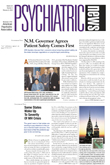In her letter in the December 5, 2003, issue, Dr. Kalpana Prasad addresses the importance of having one’s physician-leadership role acknowledged, as well as our trademark commitment to patients’ well-being. The question at large, however, is what has led to this perceived threat to our leadership role?
The answer is not insurers or other mental health professionals and certainly not patients, but we ourselves. I believe we have systematically given up authority, leadership, and advocacy responsibilities and now cry “foul” when terms are dictated to us. We have invented the term “med checks” and have deflected psychotherapy to the therapist next door, and may even be preaching this practice to the next generation of psychiatrists. We have not effectively objected to the sole role and label of “prescription/refill providers,” and yet we seem to feel threatened by mental health professionals telling us what’s best for our patients.
At the core of the leadership issue is what defines a psychiatrist. One cannot rely on the license to prescribe medications, examine patients, and order investigations as defining features, as physicians are no longer the exclusively privileged. As with psychologists in New Mexico, it is just a matter of time before other counselors and allied health professionals claim eligibility to write prescriptions for the patients with whom they work. And I believe it is also just a matter of time before some antidepressants become available without a prescription. In several developing countries, most pharmacies sell psychotropics without a formal prescription, yet psychiatrists or other physicians there do not perceive a threat to their profession or leadership role.
The definition of leadership in psychiatry goes beyond graduation from medical school, psychiatry residency, and a license to practice medicine and prescribe pills. Leaders are distinguished by their untiring advocacy, responsibility to patients, and support for patients’ access to care. Physicians are distinguished by their dedication to the study, safe application, and advancement of scientific and medical knowledge and their sacred regard for the doctor-patient relationship. Psychiatrists take pride in their holistic and biopsychosocial approach to patients’ well-being. The moment we shirk these commitments, we diminish our effectiveness as leaders, physicians, and psychiatrists.
